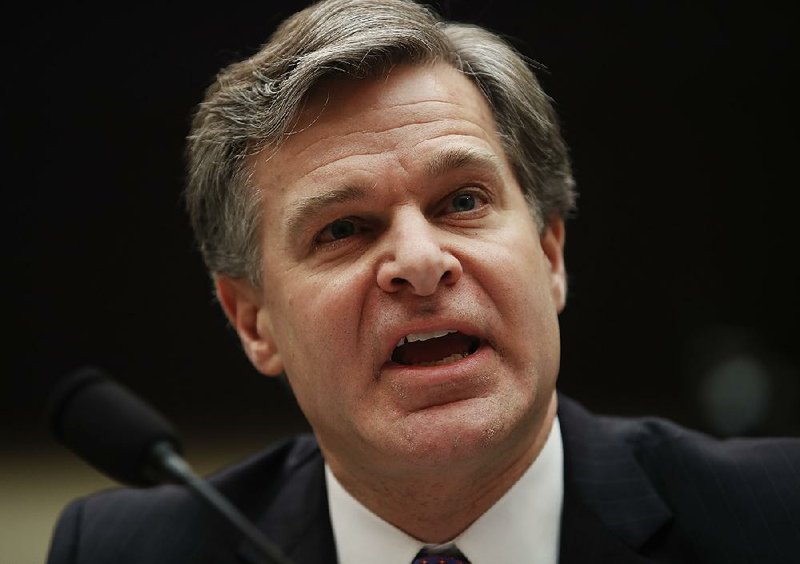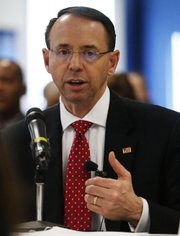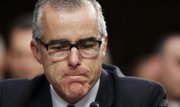WASHINGTON -- The FBI clashed publicly with President Donald Trump for the first time on Wednesday, condemning a push by House Republicans to release a secret memo that purports to show how the bureau and the Justice Department abused their authority to obtain a warrant to spy on a former Trump campaign adviser.
"The FBI was provided a limited opportunity to review this memo the day before the committee voted to release it," the bureau said in a statement, referring to the House Intelligence Committee. "As expressed during our initial review, we have grave concerns about material omissions of fact that fundamentally impact the memo's accuracy."
The comment by the FBI thrust Christopher Wray, the bureau's director, into a confrontation with the president, who abruptly fired his predecessor, James Comey, in May. Wray had pleaded in recent days at the White House to keep the document private.
Trump wants the memo released, telling people close to him that he believes that it makes the case that FBI and Justice Department officials acted inappropriately when they sought the highly classified warrant in October 2016 on the campaign adviser, Carter Page.
[PRESIDENT TRUMP: Timeline, appointments, executive orders + guide to actions in first year]
The president's stance puts him at odds with much of his national security establishment. The Justice Department has warned repeatedly that the memo, prepared by Republican staff on the House Intelligence Committee, is misleading and that its release would set a bad precedent for making government secrets public. FBI officials have said privately that the president is prioritizing politics over national security and is putting the bureau's reputation at risk.
A White House spokesman did not immediately respond to a request for comment. Rep. Devin Nunes, R-Calif., chairman of the House committee, described the FBI objections as "spurious" and accused the two law enforcement agencies of making "material omissions" to Congress and the courts.
"It's clear that top officials used unverified information in a court document to fuel a counterintelligence investigation during an American political campaign," Nunes said in a statement. "Once the truth gets out, we can begin taking steps to ensure our intelligence agencies and courts are never misused like this again."
Democrats attempted to halt the process late Wednesday when Rep. Adam Schiff, D-Calif., said in a letter addressed to Nunes that Monday night's vote to release the memo is invalid because Republicans changed part of the document before sending it to the White House for review.
Schiff, the top Democrat on the House committee, claimed in the letter that the document had been "secretly altered" by Republicans after the vote, though he did not say what changes were made.
The changes, Schiff argued, meant that the committee should halt the review process and vote on the new, altered memo. It was not immediately clear if the claim would gain traction.
A spokesman for Nunes did not immediately return a request for comment.
People who have read the 3½-page memo say it contends that officials from the FBI and the Justice Department were not forthcoming to a Foreign Intelligence Surveillance Court judge in seeking the warrant. It says the officials relied on information assembled by a former British intelligence officer, Christopher Steele, without adequately explaining to the judge that Democrats had financed the research.
Page, a former Moscow-based investment banker, had been on authorities' radar for years. He had visited Moscow in July 2016 and was preparing to return there that December when investigators obtained the warrant in October 2016.
Schiff wrote in a Washington Post op-ed published Wednesday that the push to release the memo "increases the risk of a constitutional crisis by setting the stage for subsequent actions by the White House to fire Mueller or, as now seems more likely, Deputy Attorney General Rod J. Rosenstein, an act that would echo the 1973 Saturday Night Massacre."
He was referring to special counsel Robert Mueller, who is investigating Russia's interference in the 2016 election, and to President Richard Nixon's decision to fire the independent special prosecutor overseeing the Watergate investigation, prompting the resignations of the Justice Department's top two officials.
CLAIMS OF BIAS
The memo has come to the forefront in a string of attempts by Trump's allies to shift attention from the special-counsel investigation and toward the actions of the investigators themselves.
In the case of the memo, Republicans in Congress and in conservative media have asserted that the memo will show political bias in the early stages of the Russia investigation.
The Justice Department also has been turning over to Congress thousands of text messages involving an FBI agent who was removed from Mueller's team after the discovery of derogatory comments about Trump. The communications surfaced during a watchdog's inquiry into the FBI's handling of the Hillary Clinton email investigation.
Many of the texts between the agent, Peter Strzok, and an FBI lawyer, Lisa Page, included their observations of the 2016 election and opinions of Trump, Clinton and other politicians. Strzok also worked on the Clinton email case; Page left Mueller's team before the texts were discovered.
Some Republicans have seized on the communications as proof that the FBI is anti-Trump and Mueller's probe is tainted. Wray has denied that.
The Republican-led Intelligence Committee voted along party lines Monday night to release the memo, invoking an obscure, never-before-used House rule to sidestep the usual back-and-forth between lawmakers and the executive branch over the government's most closely held secrets. Democrats on the committee objected and have prepared a 10-page, point-by-point rebuttal of the Republican document. The committee voted against releasing the Democrats' memo publicly.
Under the rule, Trump has five days to try to stop the release for national security reasons.
Democrats like Schiff have called the Republican document a dangerous effort to build a narrative to undercut the department's investigation into whether Trump's associates colluded with Russians and whether Trump obstructed justice. They say it uses cherry-picked facts assembled with little or no context and could do lasting damage to faith in federal law enforcement.
Wray had strongly objected to the move to release the memo and was allowed to review it only Sunday, after Nunes relented. Wray made a last-ditch effort Monday, going to the White House with Rosenstein, the deputy attorney general, to try to persuade the White House to stop the release of the memo. They spoke to John Kelly, the White House chief of staff, but were unsuccessful.
Democrats tried before Monday's vote to allow Wray to brief the committee on the material underlying the memo -- information so sensitive that only two members of the committee had been allowed to view it directly. But Nunes said he would not allow the head of an agency under investigation to do so, according to a transcript of the private session released Wednesday.
Trump could only block the release of the memo, not make it public himself, but with his approval, House Republicans were expected to move quickly to unveil the document. Kelly said Wednesday that he expected the memo to be released "pretty quick," while cautioning that White House lawyers were still reviewing it.
Ultimately, though, Trump was eager to see the document released. Trump was overheard Tuesday night as he exited his first State of the Union address assuring a House Republican that he would see to the document's release.
"Oh, don't worry, 100 percent," Trump told the lawmaker, Rep. Jeff Duncan, R-S.C., who had asked Trump to release the memo."Can you imagine that? You'd be too angry."
A White House spokesman confirmed early Wednesday that the administration's official position is now that Trump will release the memo.
The FBI-Trump spat came as CNN reported that Trump asked Rosenstein in December for an update on Mueller's probe and whether Rosenstein was "on my team." Rosenstein oversees Mueller's probe. As of late Wednesday, the report remained unconfirmed by other major news agencies.
During his confirmation hearing, Wray foreshadowed Wednesday's confrontation. He told senators that he was no pushover and would resist political interference.
Wray has resisted White House pressure to replace staff members, including former FBI Deputy Director Andrew McCabe, who were once loyal to Comey, to avoid appearing as if he was taking orders from the president in a job that is supposed to be politically independent. Wray did eventually sideline McCabe, who stepped down abruptly, but only after finding cause to do so.
Information for this article was contributed by Adam Goldman and Nicholas Fandos of The New York Times; by Karoun Demirjian and Josh Dawsey of The Washington Post; and by Chris Strohm, Billy House, Justin Sink and Jennifer Jacobs of Bloomberg News.
RELATED ARTICLES
http://www.arkansas…">Russian spy chiefs, CIA director huddle in D.C.http://www.arkansas…">Statement on Russia meeting on Mueller list
A Section on 02/01/2018





